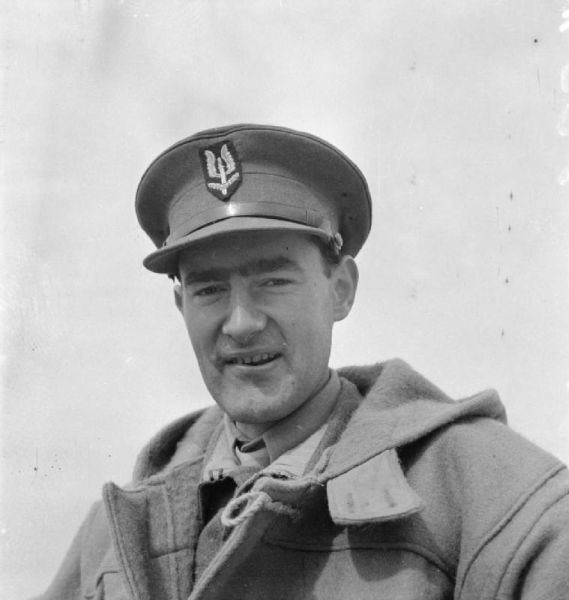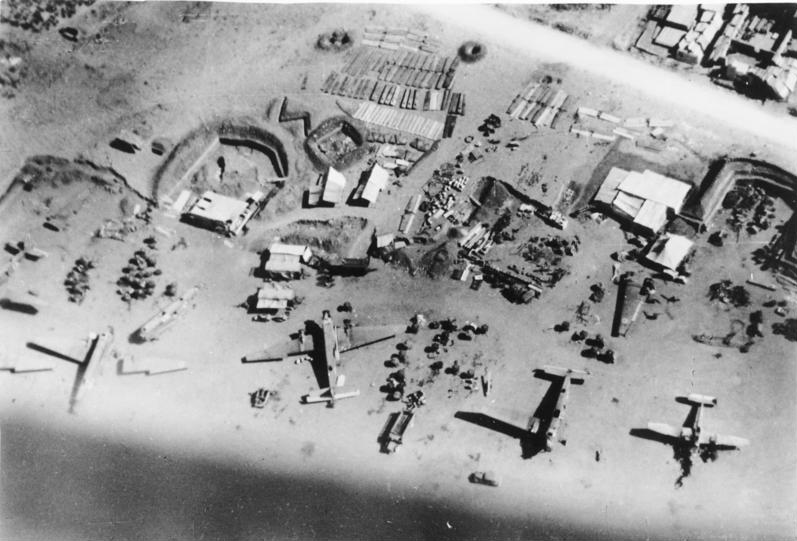Stirling, Archibald David "The Phantom Major"
- Date of birth:
- November 15th, 1915 (Doune-Stirling/Schotland, Great Britain)
- Date of death:
- November 4th, 1990 (London/England, Great Britain)
- Service number:
- 72647
- Nationality:
- British
Biography
David Stirling was he son of a Brigadeer-general. He went to Amplefort College and subsequently to Trinity College for one year. He was however too adventorous for that way of life and quit his study.
At the outbreak of WW 2 he was training to climb Mount Everest which was up to that time still unconquered but enrolled in the Scotts Guards instead. June 1940, he volunteered for a new commando unit, No 8 Commando commanded by Lt-Col Laycock, later to be known as Layforce. As a result of opposition from the supreme command, operational problems and lack of reinforcements, Layforce was disbanded in August 1941.
Stirling however was convinced that a small, highly mobile unit with the element of surprise on its side, could inflict far more damage to the enemy than a much larger unit.
He decided to visit his highest superior, General Auchinleck to discuss his plans, rather than follow the usual chain of command. In his search for Auchinleck, on crutches as a result of an accident with a parachute, he happenend to meet his deputy, General Ritchie who listened to Stirling and persuaded Auchinleck to act on Stirling’s plans.
His freshly established unit, the 1st Special Air Service Brigade, initally lacked everything, including tents and other equipment. Their first operation was to relieve a well-equipped New Zealand unit of a few small tents, a large tent and everything else that was needed, including a bar and a piano.
The first operational missions on which the men were dropped by parachute behind enemy lines in daylight ended in complete disaster with a high percentage of death and wounded. Stirling decided to start operating under cover of darkness in cooperation with the Long Range Desert Group. This decision turned out more succesful; on the German airfields near Aqedabia, Site and Agheila, a total of 62 aircraft were destroyed without a single loss to the unit. Consequently, the German and Italians troops increased security at their airfieds, often depleting their frontline troops.
Januari 1943 Stirling was taken prisoner by the Italians. He escaped four times and was subsequently interned at Colditz where he remained for the rest of the war. His brother Bill Stirling and Paddy Mayne meanwhile took over command.
After the war he became involved in the recruiting of mercenaries and the sale of arms to try and put a stop to the diminishing power of the British Empire. He also was the owner of a televsion productioncompany and the founder of the Capricorn Africa Society, a foundation for the promotion of Africa without racial discrimination.
David Stirling was knighted in 1990 and he died the same year in a home for the aged in London. He was buried near St. Cumin’s Church in Morar.
In 2002 a statue of Stirling – founder of the SAS – was unveiled on Hill O’Row.
Do you have more information about this person? Inform us!
- Period:
- Second World War (1939-1945)
- Rank:
- Acting Captain
- Unit:
- Long Range Desert Group (LRDG), Special Air Service (SAS), Combined Operations Headquarters, War Office, British Government
- Awarded on:
- February 24th, 1942
Recommendation:
"Prior to the destruction of aeroplanes, bomb stores and petrol stores at SIRTE on 12/13 De. this officer, by his energy, example, personal courage and leadership has been responsible for the directing of a small and determined body of men, and it is to his example and leading that these operations at SIRTE were such a success.
His determination to destroy the enemy has never faltered and he has overcome every difficulty placed in his way in an admirable manner."
- Period:
- Second World War (1939-1945)
- Rank:
- Acting Captain
- Unit:
- Long Range Desert Group (LRDG), Special Air Service (SAS), Combined Operations Headquarters, War Office, British Government
- Awarded on:
- February 24th, 1942
- Period:
- Second World War (1939-1945)
- Rank:
- Acting Captain
- Unit:
- Long Range Desert Group (LRDG), Special Air Service (SAS), Combined Operations Headquarters, War Office, British Government
- Awarded on:
- June 30th, 1942
- Period:
- Second World War (1939-1945)
- Rank:
- Temporary Colonel
- Unit:
- Long Range Desert Group (LRDG), Special Air Service (SAS), Combined Operations Headquarters, War Office, British Government
- Awarded on:
- November 14th, 1946
Recommendation:
"Captured in TUNISIA on 24 January 1943, Lt. Col. STIRLING was imprisoned in various camps in ITALY and GERMANY.
Throughout his imprisonment, Lt. Col. STIRLING was the instigator and planner of almost all escape and subversive activities at OFLAG VIII F/79. He was the chief of the Escape Committee and ran extensive Intelligence and Sabotage organisations. He also planned a large mass break which resulted in the move of the whole camp to BRUNSWICK.
But besides planning for others, Lt. Col. STIRLING several times escaped himself. On one occasion, he and a companion succeeded in reaching the River INN in an attempt to cross the Swiss border, and five days after his recapture and confinement in the cells at MARKT PONGAU, he and a colleague broke out once more.
Enduring great hardship and suffering from weakened physical condition, they crossed the SALZACH river and climbed the highest Alps in their attempt to reach YUGOSLAVIA; but they were betrayed to the "Landwacht" and recaptured.
Lt. Col. STIRLING has been highly praised for his work in connection with escape activities by the Senior British Officer at OFLAG VIII F/79 and by seven colleagues.
M.S.
ms 9.7.46"
- Period:
- Second World War (1939-1945)
- Awarded on:
- December 30th, 1989
- Period:
- Second World War (1939-1945)
- Period:
- Second World War (1939-1945)
- Rank:
- Lieutenant-Colonel
- Period:
- Second World War (1939-1945)
- Rank:
- Lieutenant-Colonel
Sources
- - COWLES, V., The Phantom Major, Pen & Sword Military, 2011.
- MORTIMER, G., Stirling's Men, Orion Publishing Co, 2005.
- Second Supplement to The London Gazette Issue 35465 published on the 20 February 1942
- Second Supplement to The London Gazette Issue 35465 published on the 20 February 1942
- Supplement to The London Gazette Issue 35611 published on the 26 June 1942
- Second Supplement to The London Gazette Issue 37787 published on the 12 November 1946
- Electricscotland.com
- Terry Aspinall Remembers
- Ministry of Defence, Singapore
- SAS Special Air Service
- POW record
- DSO Recommendation
- OBE Recommendation
- Croix de Guerre Recommendation












